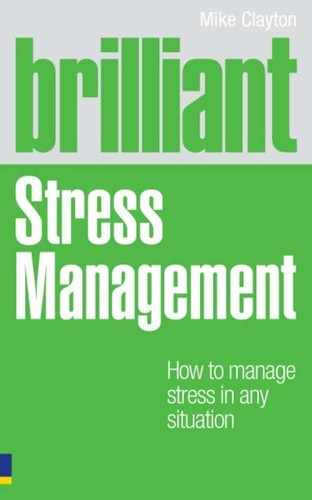38 brilliant stress management
One thing that new meditators often nd is that their body
takes the opportunity, while relaxed, to get the sleep it needs.
If this happens to you, do not worry; your body knows best.
However, once you establish a routine, it is best to avoid
times when you are over-sleepy or, indeed, overstimulated.
In the morning, try meditating after you have got up and had
a shower, but before you eat breakfast. When you get home
from work in the evening, take some time to unwind, and then
meditate before your evening meal, and before you drink any
alcohol. These aren’t rules, but they will help you get the best
from your meditation.
Breathing
Why do smokers smoke when they are stressed? It is not just
the effect of nicotine (which we will examine later); when they
smoke, they breathe deeply – which their body associates with
relaxation – and so they relax. So when you feel stress, make
a conscious effort to breathe deeply. Stand or sit upright and
take a deep breath in through your nose and exhale through
your mouth. Five or six deep breaths like this can really calm
you.
If you want to energise yourself, you need to get as much oxygen
into your bloodstream as you can. Start with the longest out-
breath that you can sustain, through your mouth. When you can
go no longer, stop, pause and then expel a little more air with a
‘ha’ sound. Now take a deep breath in and hold it for a second or
two. Then repeat the out-breath process. Now take two or three
deep in-breaths through your nose, followed by out-breaths
through your mouth. Finish with a deep slow in-breath. What
you have done is replaced as much as possible of the stale air in
your lungs. Normal out-breaths only clear half to two-thirds of
the air in your lungs, so this process will replace much more of
that air with new oxygen-rich air. Needless to say, the best place
to do this is outside.
Control your physical response to stress 39
Sleeping
Nothing is quite so important for keeping a realistic perspective
on your stressors as regular and refreshing sleep. So give sleep a
high priority in your life.
The most important step if you are having trouble sleeping
is to get yourself a sleep ritual that involves a regular time to
go to bed and get up. Do relaxing things for at least an hour
before you are ready to go to sleep, like taking a bath or lis-
tening to music. Create a regular ritual that tells your body it
is getting towards time to turn off for the night. Avoid stimu-
lants like nicotine, caffeine and alcohol for the last few hours
of the day and try to nish eating at least two hours before
bedtime – these all have a disruptive effect on your sleep. But
do not go to bed feeling hungry. If you need to snack, avoid
sugary foods and go for something like toast or cereal with
milk.
Make sure your bedroom is relaxing, well ventilated and not
too warm, and invest in the best mattress and pillows you can
afford. Remember, you spend around one-third of your life in
bed – far more than in your car or on your sofa, or watching
your television.
If you are not feeling sleepy, read a book for 20 to 30 minutes,
rather than lying awake, wishing you were asleep. If this is a
regular problem, then get more exercise in the early evening,
nishing around two hours before bedtime. The only strenuous
activity that promotes sleep immediately is sex.
Pets and relaxation
Pet ownership seems to be a great way to relieve some of the
symptoms of stress. As well as the healthy aspects of exercising
a dog, or the way responsibility for an animal can take your
mind off your own troubles, research evidence suggests that
caring for a dog can reduce blood pressure and one of the
..................Content has been hidden....................
You can't read the all page of ebook, please click here login for view all page.
